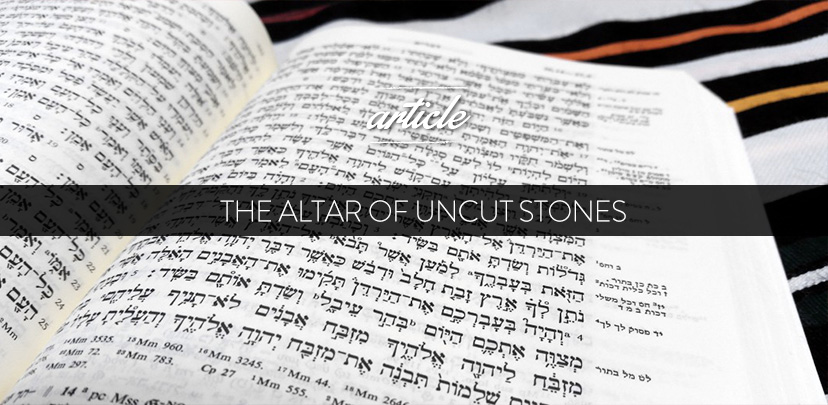From the twelve-stones of Gilgal we move to the altar of uncut stones that Joshua erected as a reminder of the people’s covenant with the Lord. After the two object lessons in obedience/disobedience of Jericho and Ai, Joshua got Israel ready to launch their campaign to capture the rest of the promised land. As part of this, Joshua built an altar to the Lord on Mt. Ebal (Josh 8:31). Specifically, Joshua remembered the instructions given concerning how the altar should be built from Ex 20:22:-
“If you make an altar of stone for Me, you shall not build it of cut stones, for if you wield your tool on it, you will profane it. And you shall not go up by steps to My altar, so that your nakedness will not be exposed on it.”
The idea was that cut stones (gazit – גָּזִ֑ית) implied the use of a sword (sometimes translated “tool”), the use of which defiles or profanes the altar. Scholars debate over what exactly it is about the sword/tool that defiles the altar and there isn’t much consensus here. Some suggest that the sword is an instrument of war and is not compatible with an altar to God, while others argue that altars are about sacrifices anyway so swords shouldn’t be a problem. I disagree. I think the key to understanding this lies in going back to the instructions that Moses left to Joshua in Deut 27:1-8:-
“Then Moses and the elders of Israel charged the people, saying, “Keep all the commandments which I command you today. “So it shall be on the day when you cross the Jordan to the land which the LORD your God gives you, that you shall set up for yourself large stones and coat them with lime and write on them all the words of this law, when you cross over, so that you may enter the land which the LORD your God gives you, a land flowing with milk and honey, as the LORD, the God of your fathers, promised you. “So it shall be when you cross the Jordan, you shall set up on Mount Ebal, these stones, as I am commanding you today, and you shall coat them with lime. “Moreover, you shall build there an altar to the LORD your God, an altar of stones; you shall not wield an iron tool on them. “You shall build the altar of the LORD your God of uncut stones, and you shall offer on it burnt offerings to the LORD your God; and you shall sacrifice peace offerings and eat there, and rejoice before the LORD your God. “You shall write on the stones all the words of this law very distinctly.””
Here we begin to get a better picture of what that altar was all about. When they crossed into the land, Joshua was instructed to find large stones and to coat them with chalk. On these stones would be inscribed God’s word – the laws of God. I can’t help but wonder if these large chalk/lime coated stones, with God’s laws inscribed on them, formed part of the altar that was built on Mt. Ebal. The word “uncut” used in v.6 here is more literally translated “whole” or “complete” (shelemot – שְׁלֵמוֹת֙ – from the same root as “shalom”). Putting all these together, it seems to me that:-
- these stones represented the complete words of God, the laws of God
- the altar to God and our worship is built on the basis of God’s complete word
- the “whole” God’s word must be kept, completely (Deut 12:32)
- we shouldn’t presume to “cut” any of it out, even by accident
The whole passage has one singular focus – that is to accurately and completely keep God’s word. The entire discussion about stones were related to the fact that upon those stones were written the law. For that reason, I believe that the use of “whole” or “complete” stones is related to what those stones represented – the whole word of God. These are God’s instructions to us concerning the kind of worship he wants from us. God did not make requests about our music, or our strength. He did not require beauty and aesthetics, nor did He ask for our feelings. He did, however, make one very very specific demand – adherence to the whole word of God. Without this in place – the rest of what we might do is most likely unacceptable to God. King Saul had to learn this lesson the painful way, 1Sam 15:22:-
“Has the LORD as much delight in burnt offerings and sacrifices As in obeying the voice of the LORD? Behold, to obey is better than sacrifice, And to heed than the fat of rams.”
Rev. Daniel Wee is currently serving as the vicar of Church of Our Saviour (Anglican) in Singapore. His interests include OT studies, photography, electronics, statistics and reading (when he has time for them!)




